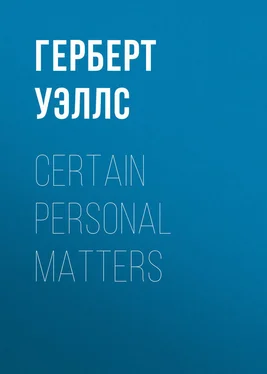Герберт Уэллс - Certain Personal Matters
Здесь есть возможность читать онлайн «Герберт Уэллс - Certain Personal Matters» — ознакомительный отрывок электронной книги совершенно бесплатно, а после прочтения отрывка купить полную версию. В некоторых случаях можно слушать аудио, скачать через торрент в формате fb2 и присутствует краткое содержание. Жанр: foreign_antique, foreign_prose, на английском языке. Описание произведения, (предисловие) а так же отзывы посетителей доступны на портале библиотеки ЛибКат.
- Название:Certain Personal Matters
- Автор:
- Жанр:
- Год:неизвестен
- ISBN:нет данных
- Рейтинг книги:3 / 5. Голосов: 1
-
Избранное:Добавить в избранное
- Отзывы:
-
Ваша оценка:
- 60
- 1
- 2
- 3
- 4
- 5
Certain Personal Matters: краткое содержание, описание и аннотация
Предлагаем к чтению аннотацию, описание, краткое содержание или предисловие (зависит от того, что написал сам автор книги «Certain Personal Matters»). Если вы не нашли необходимую информацию о книге — напишите в комментариях, мы постараемся отыскать её.
Certain Personal Matters — читать онлайн ознакомительный отрывок
Ниже представлен текст книги, разбитый по страницам. Система сохранения места последней прочитанной страницы, позволяет с удобством читать онлайн бесплатно книгу «Certain Personal Matters», без необходимости каждый раз заново искать на чём Вы остановились. Поставьте закладку, и сможете в любой момент перейти на страницу, на которой закончили чтение.
Интервал:
Закладка:
Gwendolen, after a fiery scene with Margot, in which she calls her a "petty minion," – pretty language for a young gentlewoman, – "sweeps with unutterable scorn from the room," never, to the reader's huge astonishment, to appear in the story again, and Margot flies with Di Sorno to Grenada, where the Inquisition, consisting apparently of a single monk with a "blazing eye," becomes extremely machinatory. A certain Countess di Morno, who intends to marry Di Sorno, and who has been calling into the story in a casual kind of way since the romance began, now comes prominently forward. She has denounced Margot for heresy, and at a masked ball the Inquisition, disguised in a yellow domino, succeeds in separating the young couple, and in carrying off "the sweet Margot" to a convent.
"Di Sorno, half distraught, flung himself into a cab and drove to all the hotels in Grenada" (he overlooked the police station), and, failing to find Margot, becomes mad. He goes about ejaculating "Mad, mad!" than which nothing could be more eloquent of his complete mental inversion. In his paroxysms the Countess di Morno persuades him to "lead her to the altar," but on the way (with a certain indelicacy they go to church in the same conveyance) she lets slip a little secret. So Di Sorno jumps out of the carriage, "hurling the crowd apart," and, "flourishing his drawn sword," "clamoured at the gate of the Inquisition" for Margot. The Inquisition, represented by the fiery-eyed monk, "looked over the gate at him." No doubt it felt extremely uncomfortable.
Now it was just at this thrilling part that Euphemia came home, and the trouble about the flattened hat began. I never flattened her hat. It was in the box, and so was I; but as for deliberate flattening – It was just a thing that happened. She should not write such interesting stories if she expects me to go on tiptoe through the world looking about for her hats. To have that story taken away just at that particular moment was horrible. There was fully as much as I had read still to come, so that a lot happened after this duel of Sword v. Fiery Eye. I know from a sheet that came out of place that Margot stabbed herself with a dagger ("richly jewelled"), but of all that came between I have not the faintest suspicion. That is the peculiar interest of it. At this particular moment the one book I want to read in all the world is the rest of this novel of Euphemia's. And simply, on the score of a new hat needed, she keeps it back and haggles!
OF CONVERSATION
AN APOLOGY
I must admit that in conversation I am not a brilliant success. Partly, indeed, that may be owing to the assiduity with which my aunt suppressed my early essays in the art: "Children," she said, "should be seen but not heard," and incontinently rapped my knuckles. To a larger degree, however, I regard it as intrinsic. This tendency to silence, to go out of the rattle and dazzle of the conversation into a quiet apart, is largely, I hold, the consequence of a certain elevation and breadth and tenderness of mind; I am no blowfly to buzz my way through the universe, no rattle that I should be expected to delight my fellow-creatures by the noises I produce. I go about to this social function and that, deporting myself gravely and decently in silence, taking, if possible, a back seat; and, in consequence of that, people who do not understand me have been heard to describe me as a "stick," as "shy," and by an abundance of the like unflattering terms. So that I am bound almost in self-justification to set down my reasons for this temperance of mine in conversation.
Speech, no doubt, is a valuable gift, but at the same time it is a gift that may be abused. What is regarded as polite conversation is, I hold, such an abuse. Alcohol, opium, tea, are all very excellent things in their way; but imagine continuous alcohol, an incessant opium, or to receive, ocean-like, a perennially flowing river of tea! That is my objection to this conversation: its continuousness. You have to keep on. You find three or four people gathered together, and instead of being restful and recreative, sitting in comfortable attitudes and at peace with themselves and each other, and now and again, perhaps three or four times in an hour, making a worthy and memorable remark, they are all haggard and intent upon keeping this fetish flow agoing. A fortuitous score of cows in a field are a thousand times happier than a score of people deliberately assembled for the purposes of happiness. These conversationalists say the most shallow and needless of things, impart aimless information, simulate interest they do not feel, and generally impugn their claim to be considered reasonable creatures. Why, when people assemble without hostile intentions, it should be so imperative to keep the trickling rill of talk running, I find it impossible to imagine. It is a vestige of the old barbaric times, when men murdered at sight for a mere whim; when it was good form to take off your sword in the antechamber, and give your friend your dagger-hand, to show him it was no business visit. Similarly, you keep up this babblement to show your mind has no sinister concentration, not necessarily because you have anything to say, but as a guarantee of good faith. You have to make a noise all the time, like the little boy who was left in the room with the plums. It is the only possible explanation.
To a logical mind there is something very distressing in this social law of gabble. Out of regard for Mrs. A, let us say, I attend some festival she has inaugurated. There I meet for the first time a young person of pleasant exterior, and I am placed in her company to deliver her at a dinner-table, or dance her about, or keep her out of harm's way, in a cosy nook. She has also never seen me before, and probably does not want particularly to see me now. However, I find her nice to look at, and she has taken great pains to make herself nice to look at, and why we cannot pass the evening, I looking at her and she being looked at, I cannot imagine. But no; we must talk. Now, possibly there are topics she knows about and I do not – it is unlikely, but suppose so; on these topics she requires no information. Again, I know about other topics things unknown to her, and it seems a mean and priggish thing to broach these, since they put her at a disadvantage. Thirdly, comes a last group of subjects upon which we are equally informed, and upon which, therefore, neither of us is justified in telling things to the other. This classification of topics seems to me exhaustive.
These considerations, I think, apply to all conversations. In every conversation, every departure must either be a presumption when you talk into your antagonist's special things, a pedantry when you fall back upon your own, or a platitude when you tell each other things you both know. I don't see any other line a conversation can take. The reason why one has to keep up the stream of talk is possibly, as I have already suggested, to manifest goodwill. And in so many cases this could be expressed so much better by a glance, a deferential carriage, possibly in some cases a gentle pressure of the hand, or a quiet persistent smile. And suppose there is some loophole in my reasoning – though I cannot see it – and that possible topics exist, how superficial and unexact is the best conversation to a second-rate book!
Even with two people you see the objection, but when three or four are gathered together the case is infinitely worse to a man of delicate perceptions. Let us suppose – I do not grant it – that there is a possible sequence of things to say to the person A that really harmonise with A and yourself. Grant also that there is a similar sequence between yourself and B. Now, imagine yourself and A and B at the corners of an equilateral triangle set down to talk to each other. The kind of talk that A appreciates is a discord with B, and similarly B's sequence is impossible in the hearing of A. As a matter of fact, a real conversation of three people is the most impossible thing in the world. In real life one of the three always drops out and becomes a mere audience, or a mere partisan. In real life you and A talk, and B pretends to be taking a share by interjecting interruptions, or one of the three talks a monologue. And the more subtle your sympathy and the greater your restraint from self-assertion, the more incredible triple and quadruple conversation becomes.
Читать дальшеИнтервал:
Закладка:
Похожие книги на «Certain Personal Matters»
Представляем Вашему вниманию похожие книги на «Certain Personal Matters» списком для выбора. Мы отобрали схожую по названию и смыслу литературу в надежде предоставить читателям больше вариантов отыскать новые, интересные, ещё непрочитанные произведения.
Обсуждение, отзывы о книге «Certain Personal Matters» и просто собственные мнения читателей. Оставьте ваши комментарии, напишите, что Вы думаете о произведении, его смысле или главных героях. Укажите что конкретно понравилось, а что нет, и почему Вы так считаете.








